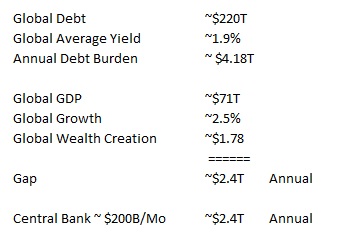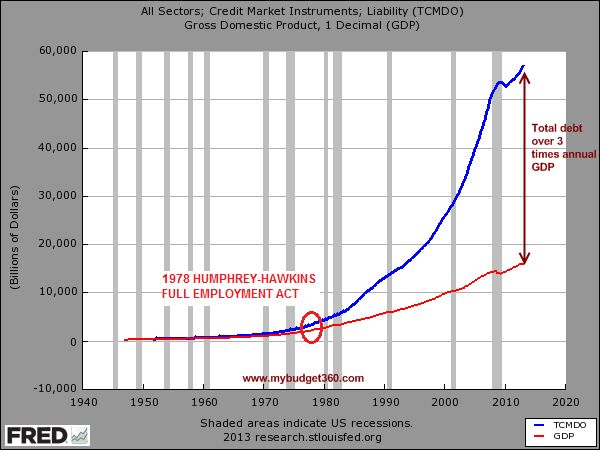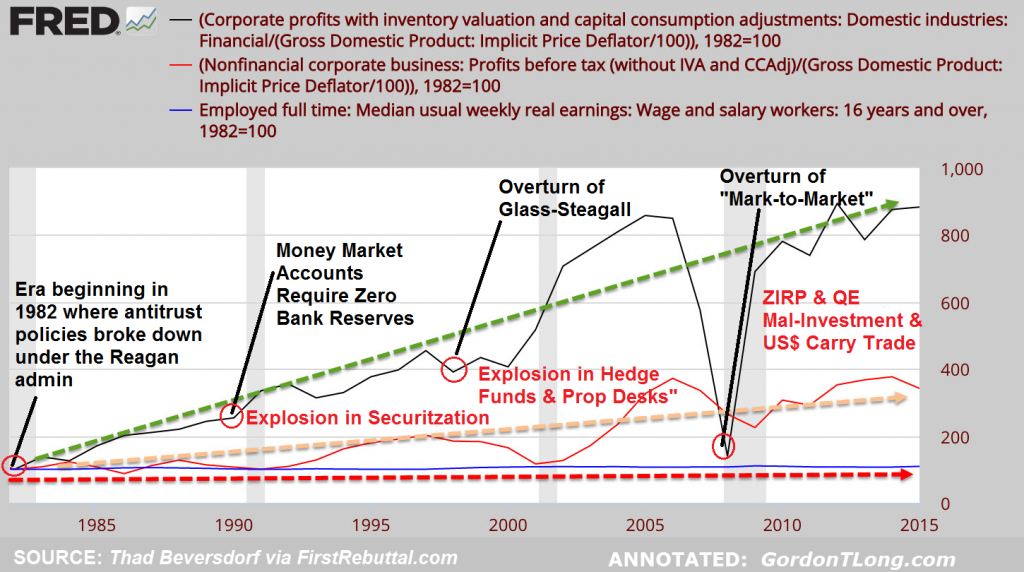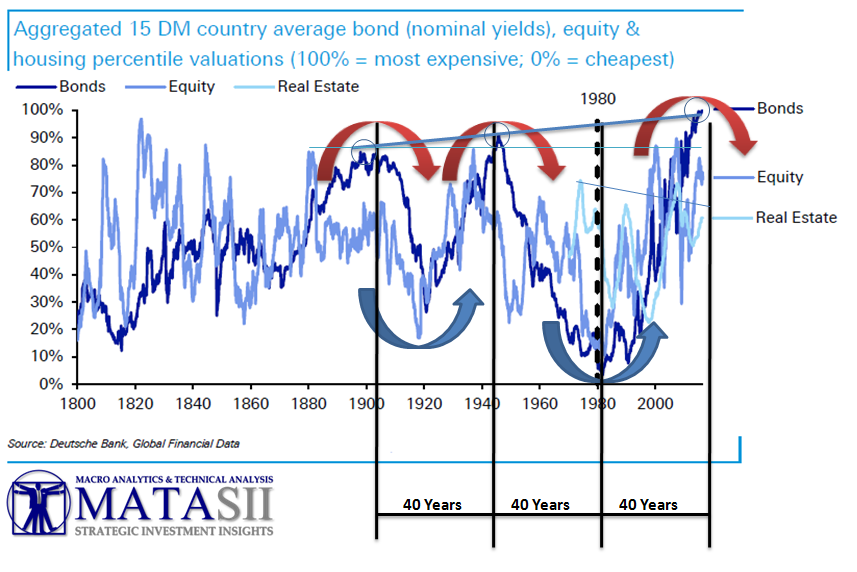
Blog
 09/28/2016 - CHART: Why the Central Banks must minimally print $200B/Mo.
09/28/2016 - CHART: Why the Central Banks must minimally print $200B/Mo.
 09/28/2016 - FINANCIAL REPRESSION & A CHRONIC UNEMPLOYMENT PROBLEM
09/28/2016 - FINANCIAL REPRESSION & A CHRONIC UNEMPLOYMENT PROBLEM

What is little appreciated today is that the Humphrey Hawkins Full Employment Act in 1978 assisted in “birthing” Financial Repression and placing us firmly on the Monetary policy path the Federal Reserve is presently imprisoned by.
Deep State planners fully understood then that employment would become an increasingly larger problem in America and within the developed nations as leveraged buyouts with immediate “downsizing”, “rightsizing” and “outsourcing” were beginning to dominate the financial engineering game of the day.
Driven by the political concerns in the late 1970s about rising unemployment, the Humphrey-Hawkins legislation in 1978 fundamentally compelled the U.S. central bank to drive interest rates progressively lower (see chart below).
Casual observers of the Fed speak of a “dual mandate” for U.S. monetary policy incorporating full employment and price stability, but careful reading of the Humphrey-Hawkins law shows that the former is paramount and must be satisfied by the Fed before price stability may be considered. Federal Reserve chairs have followed the single mandate of full employment to its logical conclusion, namely zero interest rates and the expropriation of private income.
With the peak in nominal rates in the late 1970’s the Fed switched priorities and became focused on the single mandate of full employment. This policy fixation on targeting at least nominal employment had significant costs, including a steady level of underlying inflation that has slowly undermined consumer purchasing power (thus, today’s discussion of “income inequality”). The single mandate of full employment also facilitated periodic financial bubbles and crises resulting from the manic swings in Fed policy.
WHAT THEN FOLLOWED
I found the remarks presented by Christopher Whalen of Kroll Bond Rating Agency (KBRA), at the Central Banking Series sponsored by the Global Interdependence Center in Dublin, Ireland and Madrid, Spain, September 29 and October 3, 2016 to be particularly supportive of the Financial Repression Authority’s position. As Chris Whalen highlights in Navigating an Uncertain Global Economy in the Age of Financial Repression, Financial Repression has fostered deflation and crippled income growth.
Central to any new approach to monetary policy must be the realization that the secular decline of interest rates, which is the centerpiece of financial repression, necessarily also drives deflation. Today, the Federal Open Market Committee frets over whether to raise the benchmark rates for federal funds and bank reserves a mere quarter of a percentage point. Yet anyone looking at the bond markets and, in particular, at bond credit spreads knows that there is not yet sufficient demand for credit to justify an increase in interest rates. Without a sustained increase in the yield on investment assets, the world faces a protracted period of low or no growth and the eventual destruction of public and private financial institutions that depend upon investment returns.
Just as many organizations used to rely upon the returns on investments to bolster profitability in particular, today the global economy is suffering from a diminution of income as a result of more than 30 years of financial repression. The trillions of dollars annually that is transferred from private organizations and individuals to public sector institutions via negative interest rates and quantitative easing (QE) ranks among the most regressive, anti-growth policies ever witnessed in peacetime.
….
Since the 2008 financial crisis, global growth has slowed and the overall level of debt has grown. Individuals in many nations have made an attempt to reduce their level of indebtedness, but in aggregate since 2008 nations have gone on a debt-fueled spending binge encouraged by the fact that the cost of servicing public sector debt has fallen. Open market purchases of public and private debt have been employed by global central banks to push interest rates down to zero or lower, this in an overt effort to stimulate asset prices, shift investor risk preferences, and thereby, it is hoped, stoke higher levels of aggregate demand.
Stepping back, we can see that in 20th century America, credit has been used to increase sales as opposed to forcing consumers to save sufficient cash to purchase an automobile or home in the future.
The judicious use of credit increased demand for goods and services, and employment. Today, however, the policy of using ever cheaper credit to pull tomorrow’s demand into the present day seemingly has lost its efficacy. With most nation-states unwilling or unable to use fiscal expansion to stoke short-term demand, global central banks acting alone have been asked to somehow address the burdens of global over-capacity, excessive debt, rising unemployment and slack consumer demand – simply an impossible feat!
THE ROADMAP OF HOW FINANCIAL REPRESSION WAS FURTHER SUSTAINED VIA REGULATORY LEGISLATION
 09/28/2016 - McAlvany Financial: Negative Interest Rates & Cash Control To Address Debt
09/28/2016 - McAlvany Financial: Negative Interest Rates & Cash Control To Address Debt

McAlvany Financial .. Negative interest rates and cash control seen as best way to slough off debt over to you .. Who’s the Patsy?—If you don’t know it’s probably YOU .. TRUMP Terrifies the Establishment…Proof?…Bush Sr. supports Hillary! .. 48 minutes
 09/25/2016 - The Roundtable Insight: Erik Townsend & Mark Valek With Barry Habib – Where Are Interest Rates & Real Estate Prices Heading?
09/25/2016 - The Roundtable Insight: Erik Townsend & Mark Valek With Barry Habib – Where Are Interest Rates & Real Estate Prices Heading?

Hedge Fund manager Erik Townsend of Macro Voices is joined by Mark Valek and Barry Habib in discussing the possible consequences of the recent FOMC meeting and the likely effects on the future.
Mark, born 1980 in Moedling, Austria is Chartered Alternative Investment Analyst (CAIA) charterholder and Certified Portfolio Manager (CPM). He studied business administration and finance at the Vienna University of Economics and Business Administration. In 2002, Mark joined Raiffeisen Capital Management. He was ultimately part of the multi-asset strategies team, with total assets under management of more than EUR 5 bn. His responsibilities included fund selection of alternative investments and as well as inflation protection strategies. In this role, he was fund manager of an Inflation Protection Fund as well as fund manager of various alternative investment funds of funds. In 2014 he published a book on Austrian Investing („Österreichische Schule für Anleger – Investieren zwischen Inflation in Deflation“)
As founder and CEO of MBS Highway, Barry is also Chief Market Strategist for Residential Finance Corporation, a leading national mortgage banker. Barry has also enjoyed a long tenure as a market commentator on FOX and CNBC Networks. He can be seen presenting his Monthly Mortgage Report on “Squawk Box,” the early-morning CNBC business news show. Barry also serves as a professional speaker on the financial markets, housing, negotiation, technical trading analysis, sales training, building relationships and motivation. He is also co-creator and currently Principal Managing Director of Health Care Imaging Solutions.
WILL THERE BE ANOTHER RATE HIKE IN THIS CYCLE?
The Federal Open Market Committee announced that there will be no rate hike in September. There was initially a big spike up in everything, but most of that retraced. This tells and confirms a lot of things. We did not think the Fed was going to rate hike in September, but what they did was show us that December looks like a likely hike. Last year, they want to “get one in” before the end of the year, and they’re going to want to get one in before the end of 2016.
Of the seventeen Fed members participating, we saw that fourteen believed there would be a hike before the end of the year. It’s very likely that we’ll see a rate hike in December, which means that the equity market do similar activity to last year: as far as yields and mortgage rates go, we’ll more than likely see an improvement. Historically, every time the Fed hikes rates you see money flowing into the bond market initially.
The Fed would like to hike rates but have some problems doing it. Even if they should hike rates in December, the curve and the expected rate path by now is so flat that it could be the end of this anticipated hiking cycle.
IS THERE A CASE FOR LOWER BOND YIELDS?
We could see a US 10 Year Treasury 1% yield if we’re headed to a recession, which is at a 50% chance over the next 24 months. Outside of an event like that, it’s difficult because things have changed around the world. We broke below 0 yield, which theoretically made upside potential and capital depreciation endless and the amount of negative yield could be infinite in theory. Now we’re seeing this move back toward 0, and this means that maybe capital depreciation and downside in yield truly is limited and in absence of an event, this means yields won’t go much higher since we don’t have much inflation, but they’re going to go much lower.
In the last weeks we saw a little raise in interest rates on the long end. A blow off event is more likely, from a bond price perspective. A major bull market usually ends with a blow off. The thing that will end this bull market is inflation. The latest move in correction in long term bonds was triggered from less than expected from ECB or Bank of Japan. We need these low interest rates, and they can’t afford to decrease those. ECB will likely enhance their stimulus program after March 2017 and Bank of Japan may try to also taper down. The debt situation will prevent them from stopping these QE programs and they will have to increase once more, which could bring this blow up in Treasury or bond prices.
For the time being, it’s going to be difficult for the banks to justify pushing rates below zero because they haven’t been yielding the desired result.
BANNING CASH?
There been talk of banning cash. But it seems like a far cry. It was pretty obvious a few months ago in Europe where more and more people came out with all kinds of arguments against cash. Now they’ve gotten rid of the biggest Euro note. They will have a difficult time decreasing the cash in circulation. If you can cut the amount of outstanding debt by negative interest rates over the years, that’s a very elegant way of getting out of it.
The US is looking at the PCE at 1.6% year over year, but not the ten months in a row of the CPI being over 2%, which likely more accurately reflects real inflation.
We know the Fed is horrible at forecasting. Now you’ve got a group of Fed members that promised it’d be easy to exit QE, but now they’re saying it’s here to stay for a while.
EFFECTS OF MONETARY POLICY ON ASSET MARKETS
Lots and lots of people are saying the equity market is tremendously overvalued and we’re going to enter a recession. If one hits, the equity markets are expected to go down. In reaction, central banks will continue with their intervention policies. If it’s a big one, then equities really have to tank in nominal terms, maybe even real terms, and what could really tank is the Dollar. It’s been expecting this rate hike cycle since the last four years when they announced the tapering of the third round of QE. They were able to stop printing money and raise interest rates about 25 basis points. If this turns around, all these expectations that made the Dollar the relatively greatest currency could turn sharply.
The stock market is frothy. They have high PEs, but that’s hard compare historically at because there’s been a change in options based accounting so PEs are suppressed artificially compared to other periods of time, and record stock buybacks that make PEs look better. People are buying stocks today because they have no other choice because of yield. The stock market has a way of inflicting the most pain on the most people at the worst time. We’re probably going to see a lot of problems that it’s going to cause. It’s a matter of when, not if.
Real estate in the US has a lot of legs still. There’s high demand and very good demographics, enough to surpass Baby Boomer rates. There’s very low supply, and low rates of home ownership. We have a really strong real estate market overall, and it’s going to remain strong for years to come. Things are the same in Europe. With the negative interest rate, the middle class is flocking into real estate. These population isn’t favorable toward investing in securities, but they love real estate. Part of that is because they did well in real estate but tended to invest in securities at the wrong times. Real estate had steady increase over the last few years, which is a function of interest rates, and as long as the environment is like this the fundamentals for real estate look good. But due to the indebtedness, investors should be cautious about investing too much as this asset class which can be easily taxed.
LINK HERE to the PODCAST – MP3
Abstract by: Annie Zhou <a2zhou@ryerson.ca>
 09/23/2016 - Charles Hugh Smith: The ZIRP/NIRP Gods & Their PhD Priesthood Have Failed
09/23/2016 - Charles Hugh Smith: The ZIRP/NIRP Gods & Their PhD Priesthood Have Failed

“Let’s start with the Fed Funds Rate, which the Federal Reserve has pinned near zero for years. This Zero Rate Interest Policy (ZIRP) is the god the PhD economists in the Fed and other central banks worship as the supreme force in the Universe, along with its even more severe sibling god, NIRP (negative interest rate policy), which demands that banks and depositors must pay for the privilege of holding cash .. Precisely what have ZIRP and NIRP fixed in the global economy? The short answer is ‘nothing.’ Instead of fixing what’s broken, ZIRP and NIRP have pushed a broken system further along the path of self-destruction. The priesthood’s insane obsession with forcing people to spend their savings by punishing savers with ZIRP/NIRP has failed spectacularly for a simple reason: it completely misunderstands human psychology. Now that ZIRP and NIRP have destroyed the income that was once earned on savings, the only rational response is to save more, not less, despite the priesthood’s policy of negative rates .. The priesthood is absolutely blind to another key aspect of human psychology.The policy of negative interest rates is so extreme and so destructive that it proves the priesthood and its Keynesian Cult have completely lost their way, yet their grip on power only increases. The Keynesian Cult Priesthood is not just clueless–it is forcing everyone to drink its toxic Kool-Aid. Like the crazed dictator in the Woody Allen comedy, the Keynesian Priesthood may well order us all to wear our underwear on the outside of our clothing, if they reckon that would boost ‘aggregate demand.'”
– Charles Hugh Smith*
LINK HERE to the essay
 09/20/2016 - Economist Ken Rogoff: Advocates Banning Cash
09/20/2016 - Economist Ken Rogoff: Advocates Banning Cash
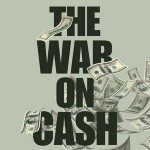
A Ban On Paper Currency
Rogoff’s new book The Curse of Cash proposes a ban on paper currency .. “It’s terrifying piece of work, for several reasons .. the cashless society, which Rogoff proposes in order to make it easier for the U.S. government to confiscate private wealth, in effect, amounts to an admission that Washington can’t pay back its debts.” .. even Rogoff himself admits that cash is a problem for central banks & governments to carry out their financial repression for addressing the escalating challenges of government debt: “In principle, cutting interest rates below zero ought to stimulate consumption and investment in the same way as normal monetary policy .. Unfortunately, the existence of cash gums up the works.” . the essay points out that “the fact that Rogoff, Ben Bernanke and others are proposing negative rates despite the considerable evidence that they will do no economic good suggests that they believe that the U.S. government cannot pay back its debts – that it is already insolvent.”
link here to the essay
 09/20/2016 - David McAlvany: All Markets Are On Monetary Life Support
09/20/2016 - David McAlvany: All Markets Are On Monetary Life Support

Wall St For Main St .. discussion about the cashless society, war on cash, financial repression & negative interest rate policy that academic PhD Keynesian Economists & central bankers are discussing & implementing .. what negative interest rates & trying to eliminate cash means (way less freedom for everyone) & how desperate governments are now & how they will become more desperate .. 47 minutes
 09/19/2016 - Intensifying Financial Repression as a New Global Bond Cycle Kicks Off
09/19/2016 - Intensifying Financial Repression as a New Global Bond Cycle Kicks Off

Deutsche Bank Predicts Intensifying Financial Repression as a New Global Bond Cycle Kicks Off
The signs abound from the current political rhetoric that trade and financial protectionism is in the wind. This is a major problem, especially with weak economic growth, central banks committed to higher inflation and stagnant (and even falling) productivity in the developed economies.
This has the potential to reverse 35 years of the “Bankers’ Bond Bonanza” and further intensify advancing Financial Repression.
Deutsche Bank Strategist Jim Reed concludes:
An oncoming lurch towards trade and financial protectionism — combined with aging populations and weak worker output — will intensify financial repression as a new multi-decade-long economic cycle kicks off this year.
……
Central bank bond-buying and stronger financial regulation in recent years, forcing financial institutions to up their domestic bond purchases, highlight how financial repression is in full swing. It’s going to get a lot worse
…….
“Maybe it will be more difficult in today’s integrated world to limit international capital flows in the same ways as after WWII (the last time Financial Repression was used to solve a US sovereign debt problem), so perhaps the cushion will come from a long period ahead of money printing and bond purchasing to ensure that there is no run on debt markets given the likely negative real returns.”
SOURCE 09-09-16 Deutsche Bank via ZeroHedge
Deutsche Bank: Bond Investors Are About to Get Crushed as a New Global Cycle Kicks Off
Weak growth, higher inflation, and stagnant productivity in developed countries will roil bond investors in the decades to come, as the benign global forces that have buoyed returns on financial assets for the past 35 years stage a sharp reversal. That’s the big-picture call from Deutsche Bank AG analysts who predict an oncoming lurch towards trade and financial protectionism — combined with aging populations and weak worker output — will intensify financial repression as a new multi-decade-long economic cycle kicks off this year.
“In our opinion we’re getting closer to a binary outcome for the global economy and financial markets,” the strategists, led by Jim Reid, wrote in a report on Thursday.
Now, there’s an inflection point in the global economy that is poised to create a perfect storm for bond investors: higher inflation, and strengthening political incentives to erode high debt burdens by hitting bond holders with effective haircuts, the bank argues.
Scenario 1 – The best case
Put bluntly the best realistic scenario for financial stability in the new era is that bond holders around the world see a slow real adjusted haircut over several years, probably over at least a couple of decades. The best example of this through history was the post WWII period where government debt was at similar levels to that currently seen. Over the next 35 years this debt was successfully eroded by a long period where nominal GDP was notably above bond yields. So bond holders took a large real haircut.
Scenario 2 – The hard break
Rather than an artificial reflation and slow successful non-systemic deleveraging, there is a genuine risk of a more binary outcome where a major country (countries) see(s) a hard default on its debt taking a lot of other debt with it domestically and possibly internationally. This is probably most likely to happen via politics – especially in Europe if a country decides to leave the single currency.Under this scenario, non-core government bond markets could see huge losses as the central bank backstop bid is removed.
A slew of analysts have warned bond investors in the coming years will be hit by negative real returns, citing stretched valuations, the prospect of rising price pressures from a low base, and monetary tightening in the U.S. Yesterday, DoubleLine Capital Chief Investment Officer Jeffrey Gundlach recommended that bond investors gear up for higher inflation and higher bond yields, saying, in a webcast, “This is a big, big moment” for financial markets, citing the prospect of rising rates. Japan’s sovereign debt market is embroiled in its biggest rout in 13 years with the 10-year benchmark climbing to minus 0.025 percent on Friday (compared with minus 0.06 percent on Wednesday, after a record-low of minus 0.3 percent in July) while the German 10-year benchmark rose to minus 0.010 percent as of 8:42 a.m. in New York. The 30-year note is at its highest level since June, after the Eurpoean Central Bank downplayed the need for more stimulus on Thursday.
ECB inaction is also the catalyst that has triggered a slide in 10-year U.K. gild and U.S. Treasury prices.
The Deutsche analysts take a structural view for fixed-income prospects with a sweeping sketch of the economic landscape, drawing upon a detailed data set going centuries back that suggest current asset valuations in 15 developed markets have hit their cyclical peak, after a bull run from the 1980s onwards. Valuations for housing and bonds relative to their historic inflation-adjusted prices now look stretched. The bank calculates that’s the case for equities too, relative to nominal GDP.

Benign globalization and demographic forces have tamed inflation in recent decades fueling stunning real returns in fixed income from the 1980s, while equities, despite the higher returns on offer, saw a much smaller level of outperformance in this period.

Central bank bond-buying and stronger financial regulation in recent years, forcing financial institutions to up their domestic bond purchases, highlight how financial repression is in full swing. It’s going to get a lot worse, the analysts say, though the counterpoint from some economists is that monetary policy is appropriately calibrated to the underlying natural rate of interest and beefier regulations are designed to make the financial system safer.
The Deutsche analysts say:
“It seems the status quo can’t hold for much longer. Monetary policy can’t be used as the predominant policy tool to the exclusion of the alternatives. Inequality surely can’t continue much further without a political backlash. Globalization and perhaps free movement/immigration can’t continue in its current form without a similar such social/political response.”
They conclude:
“Maybe it will be more difficult in today’s integrated world to limit international capital flows in the same ways as after WWII, so perhaps the cushion will come from a long period ahead of money printing and bond purchasing to ensure that there is no run on debt markets given the likely negative real returns.”
While equities will likely outperform bonds in the decades to come, the bank argues that the data suggests stocks will still lag their long-term return average. Although the prospect of lower real GDP in advanced economies is bad for both financial and real-economy assets, there’s at least one quantum of solace: Real wages are likely to rise amid a decline in populations of working age, the analysts conclude.
Deutsche Bank’s warnings follow Bank of America Corp. analysts last month, who reckon that financial assets are poised to underperform real-economy assets — such as commodities and collectible items — citing high financial-market valuations, and the prospect of looser fiscal policy, trade protectionism and wealth redistribution in developed countries. The bearish prognostications are premised on one big call, of course: there will be no positive productivity shock in advanced economies in the coming decades.
 09/16/2016 - Thorsten Polleit: Central Banks May Choose Helicopter Money Over Negative Rates
09/16/2016 - Thorsten Polleit: Central Banks May Choose Helicopter Money Over Negative Rates

Free market economist Thorsten Polleit sees policymakers as realizing that the policy of 0% interest rates is not working .. “Central banks are quite unlikely to abandon the idea of pushing real — that is inflation-adjusted — interest rates into the negative. What they might have in mind is allowing for “somewhat higher” nominal interest rates, accompanied by ‘somewhat higher’ inflation, making sure that real interest rates remain in, or fall into, negative territory.” .. references the Federal Reserve of San Francisco paper published on 15 August 2016 that monetary policy should rethink & possibly allow for an inflation of more than 2% … “Inflation — be it 2, 4, or more percent — doesn’t make a society better off. On the contrary. For instance, inflation corrupts economic calculation, thereby causing entrepreneurs to make the wrong decisions. The stimulus inflation initially is due to the errors which it produces .. Consider a case in which the central bank promises an inflation rate of 2 percent. After people have entered into their contracts, the central bank increases inflation to 4 percent. People will learn and expect future inflation to be 4 or even 5 percent. The central bank, if it wants to stimulate again the economy, has to bring inflation further up .. This kind of policy would ultimately lead to high or even hyperinflation — which has been observed in many countries around the world.” .. Polleit says this policy will help governments to manage their massive debt levels .. “It would be surprising if governments and their central banks will not opt at some stage for higher inflation in an attempt to escape the problems their policies and the issuance of unbacked paper money has caused in the first place. Alas, it wouldn’t be the first time in monetary history that unbacked paper money would be deliberately debased.”
LINK HERE to the essay
 09/14/2016 - Carmen Reinhart: Financial Repression Requires A Captive Audience
09/14/2016 - Carmen Reinhart: Financial Repression Requires A Captive Audience

McAlvany Commentary .. The opaque transfer of wealth using negative interest & regulation .. Inflation is hidden by making the same priced potato chip bag even smaller .. Never underestimate the Government’s ability to create a “captive audience” .. about 1 hour
 09/13/2016 - Tim Price: Investing In The Era Of Financial Repression
09/13/2016 - Tim Price: Investing In The Era Of Financial Repression

In his latest missive, Tim Price analyzes the “permanent portfolio” from Harry Browne .. this portfolio managed to survive the stagflationary 1970s, the crash of 1987 & even the death of communism .. “But it has been dealt a devastating blow by the financial repression of the past eight years, which has effectively dismantled two of its four pillars.” .. bonds are negative yielding & cash is targeted for being abolished .. the 2 that still make sense: “Stocks because there can be no investment rationale for owning negative-yielding bonds – and because stocks offer fractional ownership of real, productive businesses .. Gold because there is still every reason to expect further inflationism and monetary debauchery from the world’s major central banks. But nominal assets make no sense when nominal rates are the plaything of increasingly desperate policy makers, and heading inexorably below what was previously thought to be an absolute lower bound constrained at the level of zero.”
LINK HERE to the missive in PDF
 09/13/2016 - Negative Interest Rates: Not Without Consequences
09/13/2016 - Negative Interest Rates: Not Without Consequences

Essay highlights the unintended negative consequences of financial repression on investors .. “An important criticism of the low-rate environment we are in is that many people who want to save their money in a bank to gain interest wind up paying the price—particularly when inflation is factored in. Instead of earning interest on their deposits, they are essentially charged money to keep it in the bank!” .. negative interest rates are making the situation worse .. “The negative rates are shrinking bank profit margins and thus, making them reluctant to lend. Many people who would normally deposit their money in the bank now simply keep their cash in safe deposit boxes or under the floorboards. The lack of interest earnings make people who are not able to invest the money elsewhere feel that they are financially disadvantaged. Many pension funds are in trouble since the safety they sought from government bonds normally held in their portfolios has not been earning any yield to speak of, and some are forecasting they will not be able to meet their obligations to pensioners in this prolonged low-rate environment. The result is a search for yield among those institutional investors, leading them to more toward risky bonds and equities. This, some observers fear, could lead to another financial market bust if the risky investments come home to roost .. we must be mindful of the macro developments engendered by unconventional central bank policies which could have unforeseen consequences for many investors.”
LINK HERE to the essay
 09/06/2016 - Central Banks Are Continuing With Financial Repression
09/06/2016 - Central Banks Are Continuing With Financial Repression

“Central banks are screwed. They’re out of bullets. They know it. And they also know the rest of the world will catch on soon enough .. They’ve cut interest rates 667 times since Lehman Brothers collapsed .. They’ve also purchased $25 trillion of financial assets. That’s larger than the gross national product of the U.S. and Japan, the first and third largest economies in the world, respectively .. And through their sadistic negative interest-rate schemes, there’s now $8 trillion of negative-yielding sovereign debt. That’s 54% of all sovereign debt. And $13 trillion in negative yielding global bonds. That’s 28% of all bonds .. The markets have been flooded with historic torrents of liquidity to supposedly spur economic growth. But none of these experiments have prevented the world’s developed economies from flatlining .. Look at the numbers .. The developed economies are failing .. And even China’s world-beating economy is now sucking fumes .. Now that NIRP is destroying European banks and creating mass cash hoarders in Japan, central bankers will go for ‘helicopter money’ next .. Central bankers are simply trying to extend the credit bubble as long as they can so it doesn’t burst on their watch. They are politicians after all. They only care about naked power .. So, ladies and gentlemen, we are in the real life Matrix—billions of people hooked to feeding tubes waiting for someone to turn the lights out at night .. And all this is happening while the major economies that drive global growth get weaker each day.”
– Michael Covel
link here to the essay
 09/06/2016 - How Much Of The S&P 500 Stock Index Is Due To Central Bank Stimulus?
09/06/2016 - How Much Of The S&P 500 Stock Index Is Due To Central Bank Stimulus?

Deutsche Bank’s Dominic Konstam writes over the weekend, “various Fed officials have raised the issue of financial stability in the context of the reach for yield and riskier products to make up for low rates. This is part of financial repression. The logic might be that once the Fed has normalized, elements of that reach for yield and risk would be unwound and this could lead to disruptive financial market volatility.” .. the worry is that once interest rates go up, stocks will crash .. “We can illustrate this aspect of financial repression in terms of the equity market. In the post crisis world, all assets seem closely correlated to breakevens and real rates but with varying betas. We note that the equity market recently looks very expensive even to these rates through the shift in the beta on inflation expectations – so despite low inflation expectations, equities have done even better than otherwise warranted by low real rates. This shows up as a fall in the equity risk premium and defines well the hunt for yield in a repressive financial regime. How does the decompsition of performance look visually: we can illustrate the extent to which this is unprecedented with the historical performance of the equity market. Decomposing equity returns into earnings growth, changes in P/E and changes in the risk premium shows that the bulk of equity performance is best captured by the shunt lower in equity risk premium .. Central bank policies are directly responsible for approximately 40% of the ‘value’ in the market, and any moves to undo this support could result in crash that wipes out said ERP contribution, leaving the S&P500 somewhere in the vicinity of 1,400.”
LINK HERE to the article
 09/04/2016 - John Mauldin On 6 Ways NIRP Is Economically Negative
09/04/2016 - John Mauldin On 6 Ways NIRP Is Economically Negative

That Expression Doesn’t Begin To Describe The Pain Inflicted On Average People
“If you have any doubt that we’ve wandered into a new and unexplored economic universe, consider this number: $12.6 trillion. That’s the face value of government and corporate bonds currently trading worldwide with nominal yields below zero. Note that word trading. These bonds are in fact trading. Liquidity has not dried up. An active market exists for negative-yield bonds. Buyers haven’t gone on strike, and sellers aren’t desperately dumping the bonds. This is weird. None of it should be happening. Plainly, however, it is happening. Have traders and investors lost their minds? No. They are making the most rational decisions they can in an increasingly irrational world. And therein lies the problem with negative interest rate policies, or NIRP, as we now call them (not so fondly).”
Retirees and their pensions are being screwed for what now passes as ‘the greater good.’ “Because these very compassionate overlords understand that the most important prerequisite for successful future retirements is economic growth. And they think that an easy monetary environment is the necessary fertilizer for that growth. So, when they dropped rates to zero some years ago, they believed they would soon be able to raise them again – and get people’s retirements back on track – without risking future economic growth. The engine of growth would fire back up, and everything would return to normal. So much for the brilliant plan. You and I, the expendable foot soldiers in the war to reignite growth, now gaze about, shell-shocked, as the economic battlefield morphs from the Plains of ZIRP to the Valley of NIRP. The Federal Reserve’s choice to keep interest rates near zero for years on end has exacted a direct and sometimes devastating human cost.
Real people who worked hard all their lives & made sensible decisions about retirement are getting the shaft.”
LINK HERE to the PDF
 09/01/2016 - Charles Hugh Smith: “The Fly-in-the-Ointment” -> Stagnant Wages & Hidden Inflation
09/01/2016 - Charles Hugh Smith: “The Fly-in-the-Ointment” -> Stagnant Wages & Hidden Inflation
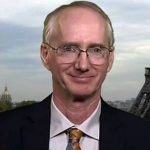
FRA Co-founder Gordon T. Long discusses with Charles Hugh Smith about stagnating wages and high real inflation rates, using the IRS tax reports as a guide to real economic activity, and the likelihood of future tax increases.
Charles Hugh Smith is the author of nine books on our economy and society, including A Radically Beneficial World: Automation, Technology and Creating Jobs for All;Resistance, Revolution, Liberation: A Model for Positive Change; and The Nearly Free University & the Emerging Economy. His blog, oftwominds.com, has logged over 55 million page views and is #7 on CNBC’s top alternative finance sites.
WHY WAGES HAVE STAGNATED
“The statistics we rely on are becoming more and more suspicious.”
Statistics are now used for perception management rather than reflecting the real economy. Of all these statistics we’re relying on to reflect reality, some of them are really suspect. We’re trying to stick with the ones that are valid. GDP is flawed but still our bellwethers, and we’re still relying on FRED database.
When you look at stagnant wages, two things pop out: GDP has continued to go up and the economy’s expanding, so wages and employment should be expanding as well. Productivity has also been rising until recently. We would expect that wages and employment would be rising at the same rate as productivity and GDP, but what we find out is that wages for the bottom 95% have stagnated.
The GDP increases and the increases in productivity are not flowing through to the bottom 80%. They’ve actually lost purchasing power in their wages. The top 5% have done really well, and the middle sector has stayed even. There are huge disconnects.
PURCHASING POWER IN DECLINE
For the last 15 years, we see wages stagnating for declining for all but the top 5%.
“Our standard of living is falling. We’re working harder, longer hours for less in real disposable income.”
Spending in the bottom 95% has been flat for the last decade. The top 5% are skimming a good percentage of the productivity gains.
“I think that’s the best and only valid way you can reach an estimate of inflation: take a basket of goods and test them in the same metropolitan area over the years.”
As consumers see lots of evidence that inflation is running higher than 1%, we start wondering why the official statistic is suppressed to 1%. The answer is that the system would break down if that 7% was reveals as reality.
The bottom 60th percentile can’t afford to buy, even with cheap interest rates and rents are going through the roof relative to their salaries.
Both the charts from Dollar Tree and Dollar General are talking about how tough business is, and that it is a serious issue for the bottom 80%. Their biggest sellers are bread, eggs, and milk. The basics staples are where people are now going to buy them, because they can get them cheaper. They’re talking about the items being hit by by price hikes: rent, food, healthcare, taxes. Rather than raise the price by 15%, they’ve cut the amount by 15%. Regardless, it’s still a 15% loss in purchasing power.
FALLING TAX REVENUES
Tax receipts are falling across the board. We’ve lost so many small businesses, and the jobs that go with them. The chains have consolidated dramatically, but put all the mom and pop stores out of business.
“We’ve lost some 770,000 net losses of small business since 2000. That is crippling to the economy, and that’s where the bottom 60% have worked.”
The United States is not alone in suffering from statistics that are being gamed. China had the same problem – people started looking at the statistics for electricity consumption because that was a more accurate gauge of economic activity than the obviously phony GDP statistics the government was issuing.
“There’s always a way to get a better statistic, but it has to be outside whatever the official government agencies can manipulate. In the United States, the one thing you can’t manipulate is the IRS tax statistics.”
Everyone that reports to the IRS reports the facts because it’s not worth their time to try any gimmicks. These are as accurate statistics as we can get. These numbers can’t be gamed like GDP and the numbers we know are rigged.
TAX INCREASES COMING IN THE FUTURE
Major tax increases are coming. There’s no question. Hilary’s already mentioning it, Trump’s already mentioning it, they know it has to come: at the state level, at the federal level, and it’s going to be at the local level and it’s going to be property taxes. It’s happening in the US already.
The government is not collecting more taxes, but the cost of running the government is going up at a significant rate. Every time in the past that tax receipts fell to the zero line, the United States was in recession. So what we’re talking about here is a recessionary economy where people are suffering a stagnant or declining household income, and their taxes are going up if they owe any taxes at all.
“Even low income people have to pay sales tax – if you jack up sales tax, everybody pays that. Even the people who were barely getting by.”
JUNK FEES AND CIVIL FORFEITURES
There’s so many fees, licenses and tolls that you have to pay; that’s where the tax is coming from, not just on income. Even police fines have gone through the roof. These are extremely aggressive forms of taxation. These are regressive taxes that hit the lower income households a lot harder than the upper income households.
If you look at these charts, a lot of people are suddenly going to be classified as “rich”. There’s going to be surcharge on the upper middle class, and you can argue that it’s justified, but we’re likely going to see a double whammy: higher regressive taxes that everyone has to pay in the form of junk feels, and higher income and sales taxes as well. So it’ll be a tax increase across every form of taxation. There is no alternative. The government is going to get the revenue however they can.
They’re actually seizing assets and you have to prove that they were wrong to get your assets back, which can take a long time. The police departments are a revenue source now in many areas. They’re gambling that people will miss something, and they’ve got the assets. And you may not get it back.
“What we’re talking about here is a vice that’s slowly squeezing the households. We’re seeing stagnating income, hours cut, hidden inflation that’s eating away at our purchasing power at a far greater rate than 1%, and we’re anticipating a lot higher taxes across the entire spectrum of fees and taxes because we can see that government tax revenues aren’t rising anymore.”
As there’s more and more pressure on the government to sustain itself, it has to resort to more and more aggressive stances like this. There’s a lot of very good people in all levels of the government that feel like they have no choice, especially where there’s a lot of underfunded pensions that they have where they have pension obligations and no money to meet them.
“If taxes are declining, that means households and businesses are making less.”
Abstract by: Annie Zhou a2zhou@ryerson.ca
Video Editor: Min Jung Kim minjung.kim@ryerson.ca
 08/31/2016 - FINANCIAL REPRESSION: How to Lift Markets via Stealth Lowering of Regulatory Risk Hurdles
08/31/2016 - FINANCIAL REPRESSION: How to Lift Markets via Stealth Lowering of Regulatory Risk Hurdles

FINANCIAL REPRESSION: How to Lift Markets by Stealth Lowering of the Regulatory Risk Hurdles

There are many ways to raise market prices but none is easier than relaxing regulatory rules originally enacted to protect the unsophisticated and unsuspecting. Historically, events associated with financial crisis have normally resulted in new regulations intended to avoid another similar crisis. Today the reverse is practiced to keep markets rising and avoid the unwinding of excessive and pyramiding debt leverage.
Let’s examine four major regulatory pillars that rose from the ashes of financial destruction and which today, as part of Financial Repression, have been removed or minimally “neutered” by regulators.
- US Anti Trust Laws – The 1890 Sherman Act
- US Bank Reserve Requirements –
- US Separation of Banks and Financial Institutions – The Glass-Steagall Act
- Mark-To-Market Derivative Valuations
You will notice in the graph below that all four regulatory reversals were changed which resulted in rising profits for the Financial Markets and Wall Street, while Main Street and the US Middle Class was left in the wake.
US ANTI TRUST LAWS – The Sherman Act
 Approved July 2, 1890, The Sherman Anti-Trust Act was the first Federal act that outlawed monopolistic business practices. The Sherman Antitrust Act of 1890 was the first measure passed by the U.S. Congress to prohibit trusts. At the time individuals like John D Rockefeller and his Standard Oil corporation had taken control of industries and had almost uncontrollable power over pricing, potential competitors and politicians.
Approved July 2, 1890, The Sherman Anti-Trust Act was the first Federal act that outlawed monopolistic business practices. The Sherman Antitrust Act of 1890 was the first measure passed by the U.S. Congress to prohibit trusts. At the time individuals like John D Rockefeller and his Standard Oil corporation had taken control of industries and had almost uncontrollable power over pricing, potential competitors and politicians.
Up until Ronald Reagan took control of the White House these laws were rigorously enforced as witnessed in the late 70’s by the breakup of AT&T into the Regional RBOCS and even the decade long attempt by the justice department to breakup the then dominant technology leader, IBM. Major corporations were under fire until the early 80’s when a more relaxed lassie-fare attitude crept in with pro-corporate sentiment. That is when the graph above begins and when the stage was set for what has resulted in blatant Crony Capitalism today dominant players controlling the Media, Military-Industrial Complex, Big Pharma, The Security-Surveillance Complex etc.
US BANK RESERVE REQUIREMENTS – Removal of Reserve Requirements for MM, CD, Time Deposits & Foreign Deposits.
The Federal Reserve requires banks and other depository institutions to hold a minimum level of reserves against their liabilities. Currently, the marginal reserve requirement equals 10 percent of a bank’s demand and checking deposits. A money market account is a savings account that allows a limited number of checks to be drawn from the account each month and just after the 1987 Financial Crisis the regulatory banking reserve requirements for Money Market accounts was summarily removed. Then effective 27 December 1990, a liquidity ratio of zero was applied to CDs and time deposits, owned by entities other than households, and the Euro currency liabilities of depository institutions. Deposits owned by foreign corporations or governments are now currently not subject to reserve requirements.
These are profound changes to the banking industry which fostered major increases in leveraged lending.
SEPARATION OF BANKS & FINANCIAL INSTITUTIONS – The Glass-Steagall Act
The Glass-Steagall Act, also known as the Banking Act of 1933 (48 Stat. 162), was passed by Congress in 1933 and prohibits commercial banks from engaging in the investment business. It was enacted as an emergency response to the failure of nearly 5,000 banks during the Great Depression.
The Gramm–Leach–Bliley Act (GLBA), also known as the Financial Services Modernization Act of 1999, is an act of the 106th United States Congress (1999–2001). It repealed part of the Glass–Steagall Act of 1933, removing barriers in the market among banking companies, securities companies and insurance companies that prohibited any one institution from acting as any combination of an investment bank, a commercial bank, and an insurance company. With the bipartisan passage of the Gramm–Leach–Bliley Act, commercial banks, investment banks, securities firms, and insurance companies were allowed to consolidate. Furthermore, it failed to give to the SEC or any other financial regulatory agency the authority to regulate large investment bank holding companies. The legislation was signed into law by President Bill Clinton.
A year before the law was passed, Citicorp, a commercial bank holding company, merged with the insurance company Travelers Group in 1998 to form the conglomerate Citigroup, a corporation combining banking, securities and insurance services under a house of brands that included Citibank, Smith Barney, Primerica, and Travelers. Because this merger was a violation of the Glass–Steagall Act and the Bank Holding Company Act of 1956, the Federal Reserve gave Citigroup a temporary waiver in September 1998. Less than a year later, GLBA was passed to legalize these types of mergers on a permanent basis. The law also repealed Glass–Steagall’s conflict of interest prohibitions “against simultaneous service by any officer, director, or employee of a securities firm as an officer, director, or employee of any member bank”.
 This was the official start to anything goes in the banking industry until it imploded in 2007-2008 with the financial crisis predicated on banks no longer owning the loans it peddled and made more money on its “prop desks’ which Dodd-Franks subsequently attempted to stop.
This was the official start to anything goes in the banking industry until it imploded in 2007-2008 with the financial crisis predicated on banks no longer owning the loans it peddled and made more money on its “prop desks’ which Dodd-Franks subsequently attempted to stop.
MARKET-TO-MARKET – Derivative Valuations
Mark-to-market or fair value accounting refers to accounting for the “fair value” of an asset or liability based on the current market price, or for similar assets and liabilities, or based on another objectively assessed “fair” value. It was done away with during the financial crisis on a “temporary crisis basis”. It has never been reinstated.
Fair value accounting has been a part of Generally Accepted Accounting Principles (GAAP) in the United States since the early 1990s, and is now regarded as the “gold standard” in some circles. Mark-to-market accounting can change values on the balance sheet as market conditions change. In contrast, historical cost accounting, based on the past transactions, is simpler, more stable, and easier to perform, but does not represent current market value. It summarizes past transactions instead. Mark-to-market accounting can become volatile if market prices fluctuate greatly or change unpredictably. Buyers and sellers may claim a number of specific instances when this is the case, including inability to value the future income and expenses both accurately and collectively, often due to unreliable information, or over-optimistic or over-pessimistic expectations of cash flow and earnings.
It it any wonder that Wall Street financial asset “pushers” never want to see it again!
THE OTHER SIDE OF THE COIN – Strangling the Competition
We could have cited other examples of how relaxed regulatory requirements have been a boon for Wall Street, Banks and Financial Intermediaries. We would be amiss not to point out that in fact the use of regulatory laws (versus removing them), in the form of “Regulatory Arbitrage” has become a mainstay for corporations to stymie competition andn “build mots” around their business models. This is done through massive lobbying efforts as a corporate strategic imperative.
 08/30/2016 - FINANCIAL POST: “Financial repression, misinformation increasingly the principal tools of central banks”
08/30/2016 - FINANCIAL POST: “Financial repression, misinformation increasingly the principal tools of central banks”

Financial repression, misinformation increasingly the principal tools of central banks
SOURCE: FINANCIAL POST: MidasLetter | August 22, 2016
Wading through the muddle of the United States Federal Reserve Bank’s minutes from the last Federal Open Market Committee meeting released on Wednesday, August 18, 2016, is not light summer reading. The text is rife with windy, repetitious, looping jargon that requires reading and re-reading.
Financial repression, or the practice by governments and their agents of reducing government debt by reducing interest rates paid to savers and devaluing currency over longer terms essentially shifts the burden of repayment onto the backs of the public. First described by economists Carmen Reinhart et al in a paper entitled “The Liquidation of Government Debt“, financial repression is described thus: “Financial repression includes directed lending to government by captive domestic audiences (such as pension funds), explicit or implicit caps on interest rates, regulation of cross-border capital movements, and (generally) a tighter connection between government and banks.”
That, coupled with confusing and excessively verbose and conflicting media statements, serve to bamboozle the investor marketplace into a state of suspended animation, where bold moves are neutered and throttled capital velocity ensure becalmed markets.
The practice has taken on new and significant meaning for individual investors, since the advent of quantitative easing and “negatively yielding” government bonds, which are now seen as threats to overall financial stability. The proliferation of new capital means competition for assets in markets that are meant to drive prices higher, which massively distorts asset valuations overall.
In the modern context, evidence of collusion among the G7 countries in repressing financially their own captive domestic audiences is visible in the communications originated by government institutions and parroted by mainstream financial media outlets.
After collectively pumping US$150 billion into the world inventory of government-fabricated capital in the last quarter, it appears the mood has suddenly shifted, and a consensus arrived at seeking to assuage the concerns of investors in sovereign debt and associated derivatives who are increasingly worried about debasement and the spread of “negative yields.” (Their term for “investment fees.”)
A series of press releases and mainstream news articles last week was remarkable for the apparently coincidental shift in tone and accidental alignment on messaging.
The European Central Bank, for example, issued a communique stating that the Brexit “level of stress had been contained, with no evidence of disorderly price movements.” The bank further opined that “fiscal policy stance was expected to be neutral in 2017, after being slightly expansionary in 2016, and also highlighted the need for full and consistent implementation of the rules of the Stability and Growth Pact, both over time and across countries, in order to maintain confidence in the fiscal framework.”
Wading through the muddle of the United States Federal Reserve Bank’s minutes from the last Federal Open Market Committee meeting released on Wednesday, August 18, 2016, is not light summer reading. The text is rife with windy, repetitious, looping jargon that requires reading and re-reading to ascertain its intended meaning. One might go so far as to surmise that it’s designed not to be read.
A distillation of the intended meaning is thus akin to the interpretation of hieroglyphics or cave paintings from a lost civilization.
So it’s no surprise then that media sources stuck with the same limitations arrive at disparate conclusions as to what information is contained in the minutes.
The Wall Street Journal, for example, discerned the insinuation for a potential interest rate hike in the fall. “The Fed’s Wednesday release of minutes from its July 26-27 meeting suggested a rate increase is a possibility as early as September, but that the Fed won’t commit to moving until a stronger consensus can be reached about the outlook for growth, hiring and inflation.”
Bloomberg, meanwhile, concluded that January 2018 is the soonest that a rake hike is possible.
Confused? You’re supposed to be. How else to quietly liquidate the unprecedented massive government obligations into the public interest while pretending that all is well?
 08/28/2016 - Incrementum Ronald-Peter Stoeferle On Financial Repression
08/28/2016 - Incrementum Ronald-Peter Stoeferle On Financial Repression

“Financial repression is a historically continuous process. Once governments are no longer able to finance their expenses with the means at their disposal, they always avail themselves of the financial repression toolbox. In view of the intractability of today’s situation, in which mountains of debt have long grown beyond the threshold of comprehensibility and structural deficits are obvious, savers have to be cautious. What can investors do? They should acknowledge that their wealth is under threat and obtain information on potential alternatives.”
– Ronald-Peter Stoeferle
LINK HERE to the article
 08/28/2016 - Paper by Federal Reserve At Jackson Hole – One Option: “Abolish Paper Currency”
08/28/2016 - Paper by Federal Reserve At Jackson Hole – One Option: “Abolish Paper Currency”

Overlooked at Jackson Hole – Kansas City Federal Reserve paper: “With these advantages in mind, the paper describes three methods by which the zero bound on interest rate policy can be unencumbered completely. The three methods in turn would: i) abolish paper currency; ii) introduce a market determined flexible deposit price of paper currency; and iii) provide electronic currency (to pay or charge interest) at par with deposits, with or without the provision of paper currency as in (ii) above. Each method is assessed for its effectiveness, technological requirements, institutional modifications, potential for expedited implementation, and acceptability with the public at large.”
LINK HERE to the paper




